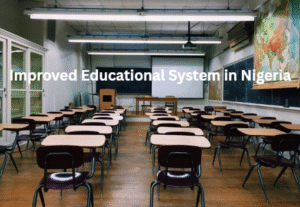With the way thing are going in Nigerian Academic sector, can one boastfully give credits to it? It is imperative to dig into the major Factors that can bring growth to improve Educational System in Nigeria.

Education is the bedrock of any nation’s growth. It shapes future leaders, equips individuals with life skills, and drives innovation. But in Nigeria, the story is different. While many children dream of becoming doctors, engineers, teachers, or tech experts, the system meant to prepare them often falls short. From overcrowded classrooms and unmotivated teachers to outdated materials and poor infrastructure, it’s clear that Nigeria’s educational sector needs serious attention.
The challenges are real but so are the opportunities to fix them. The good news? Improvement is possible. With the right strategies, commitment, and collaboration, we can build an education system that truly supports every Nigerian child regardless of background or location. Before diving into the practical solutions, let’s first take a closer look at the real life issues holding our schools back.
Understanding the Real Challenges Facing Nigeria’s Schools
Before suggesting fixes, it’s important to see what’s really holding back our schools. These problems go beyond textbooks, they affect everything from classrooms to community attitudes. Let’s break it down simply:
1. Schools That Can’t Keep Up Financially: Many public schools are trying to run on pennies. Think about it, no funding means no books, no materials, and no repairs. Teachers are sometimes unpaid for months, classrooms are packed, and students are left without the basic tools to learn. It’s hard to teach when you don’t have even a single textbook per class.
2. Teachers Without The Tools They Need: Imagine learning to cook with no kitchen tools whatsoever. That’s what it’s like for teachers who haven’t been trained in years or don’t have updated materials. Without modern methods and equipment, they can’t bring lessons to life, and students wind up memorizing facts rather than understanding ideas.
3. Outdated Curriculum That Ignores Modern Needs: We’re still teaching subjects in ways that feel like the 1990s, rote memorization, rigid schedules, and little room for creativity. Students earn certificates, but not the hands on skills they actually need. When no one grows a garden in agriculture class, how does someone learn to build one?
4. Buildings That Are Broken Down: Teaching under a leaking roof, with cracked walls and no proper toilets, this is many students’ reality. Imagine going to school in classrooms with no chairs or light. It feels more like a hardship camp than a place to grow.
5. Too Far From School: For some kids, going to school means trekking for miles through rough terrain. In conflict zones, it’s even riskier, kidnappings and violence keep children home. When schools aren’t within reach, education becomes a luxury, not a right.
6. Kids Dropping Out Too Early: Poverty, chores, early marriages, it all pushes students out of school long before they finish. Many girls get pulled out just as they hit puberty, and that’s a hard hit on their chances in life.
7. Promising Plans That Never Happen: Nigeria often launches great educational programs but they fizzle out quickly. Shiny policy ideas collect dust on shelves when budgets vanish or new leadership arrives. Sadly, plans keep getting restarted rather than followed through.
8. No One Watching What Happens Next: Once an initiative starts, who’s checking if it really works? Funds disappear, school repairs stall, and nobody notices. Without accountability, it’s easy for money and effort to go down a black hole.
9. Left Behind In The Digital Age: Even while the global classroom is going digital, many schools here have no computers or Wi-Fi. Kids are learning about yesterday’s world using yesterday’s tools and it leaves them at a disadvantage.
10. Cultural Habits Holding Back Change: In some places, it’s just accepted that only boys go to school. Girls stay home to cook or fetch water. Kids are pulled out to help on family farms. These deep rooted beliefs limit potential even when schools are nearby.
READ ALSO: Online Learning Courses For Nigerian Students
What Can Be Done to Improve Education in Nigeria?
Solving Nigeria’s educational problems requires more than just new buildings or textbooks. Real improvement lies in addressing the social, economic, political, and cultural factors that shape the system. These areas, if properly tackled can drive lasting change and create a stronger, more inclusive education for all. Below are 12 practical and powerful factors that can help improve Nigeria’s educational system:
1. Empowering Educators
Teachers are the heartbeat of education and are pivotal to educational success, but in many Nigerian schools, they are like soldiers sent to war with no weapons, no resources, poor training, and little motivation. What this really means for students; If a teacher isn’t trained in modern teaching methods or updated in their field, students miss out on current knowledge and practical learning. This is one reason why many graduates struggle in real life work situations. Imagine a biology teacher in 2025 still teaching from a 1998 textbook with no access to a microscope. That’s the reality in many schools today. To fix this, we must start by empowering our educators; Setting up digital teacher training centers in each state, giving teachers quarterly workshops and refresher courses, providing tablets or laptops with preloaded curriculum content, introducing performance bonuses for excellence in teaching can really help this teachers also beyond competitive salaries, providing continuous professional development, mentorship programs, and access to modern teaching resources can enhance their effectiveness.
Support systems, including housing and transportation allowances, can further motivate educators to commit to their roles, especially in underserved areas. Investing in teachers ensures a ripple effect of quality education across the nation. An empowered teacher is a gift that keeps on giving for decades.
2. Curriculum Reform
A functional curriculum should build thinkers and creators not just exam passers. The current curriculum often emphasizes theoretical knowledge over practical application. The current curriculum is like preparing students for a world that no longer exists. Students are taught to memorize facts for exams, not to solve problems or innovate. Students graduate with head knowledge but no practical know how. For instance, a graduate in Agriculture may never have stepped foot on a real farm during training. If you give students only chalk and talk, you can’t expect them to build businesses, solve local issues, or compete globally. We need to:
- Add hands on learning to every subject, including arts, sciences, and business.
- Introduce coding, robotics, and entrepreneurship from primary school.
- Partner with industries so students can intern and learn real-world applications.
Integrating subjects like entrepreneurship, digital literacy, and vocational training can prepare students for real world challenges. Such reforms should reflect both global trends and local contexts, ensuring students acquire skills relevant to today’s job market. This approach fosters innovation and self reliance among graduates.
3. Infrastructure Development
Creating Conducive Learning Environments is very important, many schools lack basic facilities, hindering effective learning. Investing in well-equipped classrooms, laboratories, libraries, and sanitation facilities is crucial. Regular maintenance ensures these infrastructures remain functional and safe. Collaborative efforts between government and communities can sustain these improvements, providing students with environments that stimulate learning.
4. Enhancing Accessibility
That is bridging Educational Gaps in Marginalized Areas. In regions affected by conflict or poverty, access to education remains a challenge. Implementing mobile schools, offering scholarships, and providing school meals can encourage enrollment. Community engagement is vital to address cultural barriers, especially concerning girls’ education. Tailored strategies ensure inclusivity and equal opportunities for all children.
5. Integrating Technology
The digital divide in Nigeria hampers educational progress. Incorporating technology through e-learning platforms, interactive software, and online resources can enhance learning experiences. Training teachers to utilize these tools effectively is essential. Such integration prepares students for a technologically driven world and can compensate for resource limitations in traditional settings.
6. Student Support Services
Prioritizing Mental Health and Guidance is necessary. Academic success is intertwined with emotional well being. Establishing counseling services in schools can address issues like stress, trauma, and career uncertainty. Programs focusing on life skills, peer mentoring, and mental health awareness create supportive environments. These services empower students to navigate challenges and make informed decisions about their futures.
7. Ensuring Safety
Security concerns, including kidnappings and violence, disrupt learning. Implementing safety measures like secure perimeters, trained security personnel, and emergency response protocols is imperative. Collaborating with local communities can enhance vigilance and rapid response to threats. A safe learning environment is foundational to educational attainment.
8. Increasing Education Funding and Making Sure It’s Used Wisely
One of the biggest challenges facing Nigeria’s educational system is not just the lack of money, it’s also how the little that’s available is spent. For real change to happen, the government needs to treat education as a top priority by setting aside a bigger share of the national budget for it. When more money is invested, schools can afford to hire qualified teachers, build better facilities, provide learning materials, and support struggling students. But pumping money into the system isn’t enough. We also need strong accountability systems to track how that money is used. This means regular audits, transparent reporting, and making sure the funds actually reach the classrooms, not just stay on paper. Community led monitoring groups and education focused NGOs can help hold officials accountable and prevent mismanagement. When funding is both increased and properly managed, every naira spent can go a long way in transforming the learning experience for Nigerian students.
9. Community Engagement
Fostering Collaborative Educational Efforts can improve the educational system in Nigeria. Active participation from parents and local stakeholders enhances school management. Strengthening Parent Teacher Associations (PTAs) and involving communities in decision making processes promote transparency and accountability. Such collaboration can lead to resource mobilization, improved school governance, and culturally relevant educational practices
10. Maintenance Culture
Neglecting school maintenance leads to rapid deterioration of facilities. Implementing regular upkeep schedules, allocating maintenance budgets, and involving students in cleanliness drives can preserve infrastructure. A well maintained environment reflects the value placed on education and enhances student morale.
11. Addressing Socio Cultural Barriers
Promoting Inclusive Education is highly recommended for Nigerian educational system. Cultural norms and economic hardships often impede education, especially for girls. Community sensitization programs can challenge detrimental beliefs and practices. Providing incentives like free uniforms, learning materials, and conditional cash transfers can alleviate financial burdens. Inclusive policies ensure that every child, regardless of background, has access to quality education.
12. Policy Implementation
This involves strengthening Governance and Political Commitment. Effective policies require diligent implementation and political will. Appointing qualified personnel to educational leadership positions, establishing monitoring and evaluation frameworks, and ensuring continuity across administrations are crucial. Depoliticizing education fosters consistent progress and builds public trust in the system. By addressing these factors with tailored strategies and genuine commitment, Nigeria can pave the way for a robust and equitable educational system that meets the needs of all its citizens.
Conclusion
Improving Nigeria’s educational system is not just a dream, it’s a responsibility we all share. From the government and school leaders to teachers, parents, and students themselves, everyone has a role to play. While the challenges may seem overwhelming, the solutions are within reach. By investing in teachers, embracing technology, reforming outdated policies, and making schools safer and more inclusive, we can create real change one step at a time. Education should never be a luxury or a struggle. It should be a tool for empowerment, growth, and nation building. When we prioritize education, we invest in a brighter, more prosperous Nigeria for generations to come.


